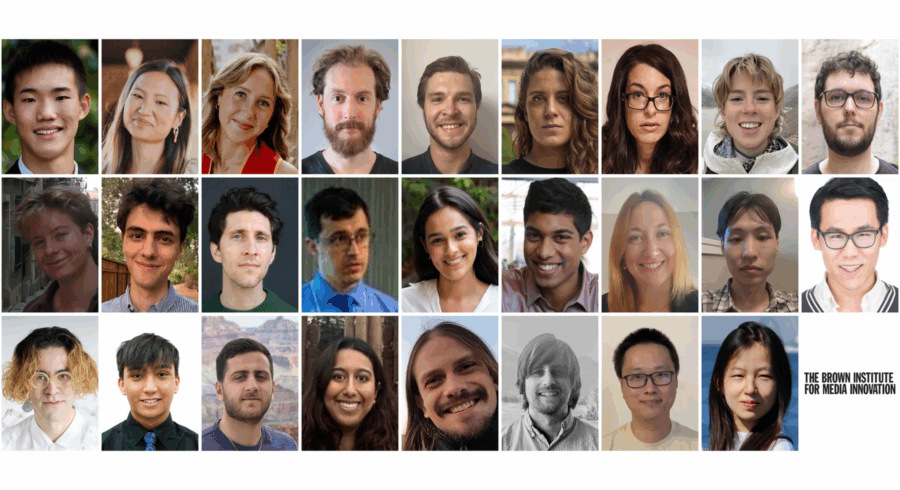The Brown Institute, a collaboration between Columbia Journalism School and Stanford Engineering, awards annual “Magic Grants” to projects across both campuses that blend journalistic insight with technical innovation – from new tools for creators to technologies designed in the public interest.
This year, the 14th Magic Grant competition drew a strong pool of proposals exploring how technology can advance journalism, civic life, and creative expression. After several rounds of evaluation, 11 full Magic Grants were awarded for 2025-26, along with one smaller “Seed” grant. Two of this year’s grants are bicoastal – with collaborators based at Stanford and Columbia.
As is typical for the Magic Grant program, the new cohort reflects a wide thematic range – this breadth is a source of pride for Stanford Engineering and Brown. One team is building LAIA, an AI-powered system that drafts and evaluates Freedom of Information Act (FOIA) appeals to strengthen government transparency in Brazil. Another, Pattern Magic, will convert 60,000 historical sewing patterns into interactive 3D garments for scholars and educators. And Framing the Mind will model how video-editing choices steer audience interpretation, aiming to give creators research-backed tools for more intentional editing. Together, the selected projects underscore the program’s commitment to marrying technical innovation with a desire to tell impactful stories.
“You can’t talk about technical innovation without mentioning AI – and that’s especially true in journalism,” said Mark Hansen, professor of journalism at Columbia University and East Coast Director of the Brown Institute. “Our 2025-26 grantees will develop new human-AI workflows that extend what reporters can do. Their projects are collaborations between human judgment and machine capability, and they’ll demonstrate what’s possible in journalism.”
Established in 2012 with a generous gift from the famed Cosmopolitan Magazine editor Helen Gurley Brown, the Brown Institute honors the memory of Helen’s late husband, David Brown, a successful filmmaker and alumnus of both the Columbia Journalism School and Stanford University. The institute is committed to fostering unique interdisciplinary collaborations, sparking the “magic” that arises from combining diverse perspectives and expertise.
“I am especially excited for this year’s projects, as they cover a broad diversity of topics in media, from developing new approaches to collecting information, analyzing it, and synthesizing it into stories told through text, audio, and video,” said Maneesh Agrawala, professor of computer science at Stanford Engineering and the West Coast Director of the Brown Institute.
We extend our warmest congratulations to this year’s Magic Grant recipients. It’s a privilege to support your visionary projects, and we’re excited to see the stories, insights, and innovations you bring to life in the months ahead!
2025-26 MAGIC GRANTS
Codillon
Francis Chua, BS Candidate in Math and CS (Stanford); Majd Nasra, MS Candidate in CS (Stanford); Haibib Kerim, BS Candidate in CS (Stanford); Advised by Professors Chris Gregg and Keith Winstein (Stanford)
Introductory computer science classes face the unique challenge of exposing modern machines’ raw power, capable of computation orders of magnitude faster than a human, at a comprehensible scale to students of diverse backgrounds. Codillon is an endeavor to develop not only a curriculum revolving around music and signal processing, but also a purpose-built WebAssembly editor. By grounding the class in a tangible medium, designing a user interface that encourages exploration, and choosing a language with simple syntax, this project aims to increase the accessibility of computer science and to enable students to creatively interact with their own devices.
Desire Path Mapper
Eric Bolton, MS ’19 in Journalism and MS ’19 in CS (Columbia); Brook Constantz, PhD in Environmental Studies (UC Santa Cruz)
Desire Path Mapper will create a participatory urban planning platform that transforms anonymous citizen-submitted commute data into equitable, community-driven street redesign proposals that prioritize pedestrians and cyclists, honoring the natural wisdom of desired paths.
The Dicks
Sally Herships, Director of Audio Program (Columbia Journalism School); Mark Fiore, Independent Visual Journalist and ’24 Knight Journalism Fellow (Stanford); Maty Bohacek, BS Candidate in CS (Stanford)
Building on the reporting behind “The Dicks” investigative audio podcast, the team will develop groundbreaking AI tools to support the creation of a video series clearly illustrating complex financial tax crimes. The tools aim to allow animators to train generative AI on their own body of work, creating an ethical alternative for artists interested in using this new technology.
Faithful and Personalized Visual Media Content Generation with Self-Verification and Improvement
Jiaju Ma, Yunzhi Zhang, and Vishnu Sarukkai, PhD Candidates in CS (Stanford); Advised by Professors Jiajun Wu and Kayvon Fatahalian (Stanford)
The project proposes a framework to ensure AI-generated visual media accurately follows user instructions. By representing both visual content and user prompts as programs, the system can automatically verify and iteratively refine the output. This approach aims to empower creators – such as journalists and designers – to produce precise, personalized visual content that aligns with specific needs and preferences.
Framing the Mind
Jean-Peïc Chou and Sharon Zhang, PhD Candidates in CS (Stanford); Advised by Professor Judith Fan (Stanford)
Framing the Mind approaches the video editing process as an act of storytelling rather than a mere technical assembly. By modeling audience interpretation, the project will investigate how editing shapes what viewers believe, feel, and understand – ultimately aiming to support editors in crafting more intentional stories.
HiFiSketch
Chuan Yan, Postdoc Researcher in CS (Stanford); Lvmin Zhang, PhD Candidate in CS (Stanford)
HiFiSketch is a creative tool that converts freehand sketches, like those drawn with pencil or ink, into fully editable digital drawings without losing their original style or texture. By combining advanced stroke detection and brush-style preservation, it allows artists to freely switch between traditional drawing and precise digital editing. This enables faster iteration, cleaner compositions, and more expressive control in both artistic and design workflows.
LAIA – AI for transparency. Accuracy for democracy.
Maria Vitória, ’23 SIPA Visiting Researcher (Columbia) and Cofounder/Executive Director at Fiquem Sabendo; also of Fiquem Sabendo: Bruno Morassutti, Cofounder and Director of Advocacy; Taís Seibt, Strategy Director and Researcher; Vitor Baptista, CTO; Igor Laltuf, Data Engineer; Gabriella Pio, Project Manager
Fiquem Sabendo will build an AI-powered tool to draft high-quality Freedom of Information Act (FOIA) appeals, targeting the most common and impactful denial types in Brazil. With a deep focus on accuracy and evaluation, LAIA will create a replicable framework for how civic AI can strengthen democratic access to public information worldwide.
Literate Tracing: Unusually Interactive, Visual, and Informative Software Documentation
Matthew Sotoudeh, PhD Candidate in CS (Stanford); Advised by Professor Dawson Engler (Stanford)
Modern computer software has grown extremely complex, making it harder for computer users to study, customize, and control the software they use every day. Literate Tracing will fight back against that complexity by developing new software documentation techniques so that system experts can explain how software works in ways that are more visual, interactive, concrete, and informative than traditional documentation. Over the course of the project, we plan to build a collection of such documentation explaining the inner workings of core software like operating systems, office suites, text editors, and web browsers.
Pattern Magic
Noah Toyonaga, Postdoc Researcher (Stanford); Conlan Olson, PhD Candidate in CS (Columbia); Advised by Professor Manu Prakash (Stanford)
Pattern Magic will build a pipeline that converts more than 60,000 historic 2D sewing patterns from the University of Rhode Island’s Commercial Pattern Archive into accurate 3D garment reconstructions, then publish an interactive repository and toolset that lets historians, artists, and educators explore and reuse both the original patterns and their digital models.
PolyGraph
Michael Keller, MS ’11 in Journalism (Columbia); Rich Harris, Software Developer
PolyGraph is the friendliest data analysis app for journalists on tight deadlines. It transforms spreadsheets into newsroom-ready visuals in seconds.
Subline
Avery Louis, BS Candidate in Engineering (Stanford); Hannah Woodworth, MA Candidate in Data Journalism (Stanford); Lucy Zimmerman, BS/MS Candidate in CS (Stanford); Akanshya Bhat, MS Candidate in CS (Stanford); Advised by Dana Chiueh (Minnesota Star Tribune) and Serdar Tumgoren, Visiting Professor (Stanford)
Subline is an AI-powered tool that helps journalists make sense of unstructured newsroom archives by mapping relationships between people, events, and institutions through a dynamic knowledge graph. Because archival reporting is often difficult to search, critical context can be lost and important stories can go untold. Building on an existing prototype linked to a browser extension, this research project refines the underlying knowledge graph to improve accuracy, usability, and adaptability across newsrooms.
2025-26 MAGIC “SEED” GRANT
Here Today
Justine Landis-Hanley, MS ’25 in Journalism (Columbia); Alex Klavens, MS Candidate in Journalism (Columbia); Alex Tighe, Podcast Producer (Bloomberg)
Here Today is a new text-based news service designed to help New Yorkers stay informed without contributing to news fatigue. Each day, subscribers receive a text message with the top local headlines and weather, and can reply with simple prompts to learn more, receiving links to full stories from local outlets. Built on custom software that integrates Contentful and Twilio, the platform allows editors to easily curate content and deliver interactive daily newsletters.

